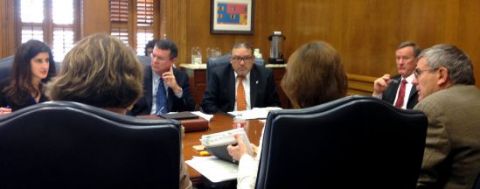Page title
Space and Time
Main page content
Readers of this blog know that I’ve been visiting as many campuses as I can in recent weeks. This week I’ve been mostly hunkered down in Austin, prepping for the upcoming Board of Regents meetings. For those of you who don’t know, The Regents meet five times a year in regularly scheduled, two-day sessions, in addition to special-called meetings. This is where the business of the UT System gets done. Regents approve our budget, set tuition, fund initiatives and chart the course for all UT institutions.
The agenda for the May meeting isn’t quite ready, but I can assure you it will be full of interesting and important business – and, should you desire, you can watch all the action live on the Board of Regents webpage .
I may not have visited any campuses this week, but between meetings I was able to keep up with news from around the system – and I must say, if you need a daily dose of inspiration, go the UT System website or the websites of any of our individual institutions. Like me, I’m sure you’ll marvel at all the amazing things taking place throughout our system.
Just yesterday I read that NASA has selected UT Arlington as one of four institutions to develop better methods of oxygen recovery and reuse on human spacecraft, which NASA says will help “enable our human journey to Mars and beyond.” UT Arlington researchers will be designing and building something called a “microfluidic electrochemical reactor,” which will recover oxygen from carbon dioxide that is extracted from the air in the cabin of a spacecraft. The science is a bit over my head, but it sounds very cool to me.
While the scientists at UT Arlington were focused on space travel, psychology researchers at UT Austin were doing a little time travel, solving the nearly 300 year old mystery of who exactly wrote the play “Double Falsehood,” published in 1728. Turns out, it was William Shakespeare! In recent years, language analysis software and other tools have been developed that enable researchers to identify authors based on the words they used. As I understand it, the team at UT Austin can now create a deep psychological profile of a writer based on their use of language. I hope they don’t look too closely at this blog!
Those two examples don’t even scratch the surface of all the interesting, important – and yes, inspiring – things going on across the UT System this week, and every week.
I write this blog (almost) every week because I want to keep you up to date. But more importantly, I want to remind you that we are all connected – we are one UT System – and together we are changing Texas and the world for the better.
I look forward to seeing you when I resume my travels through space and time. In the meantime, thank you for taking the time to read my blog. Have a great weekend.


